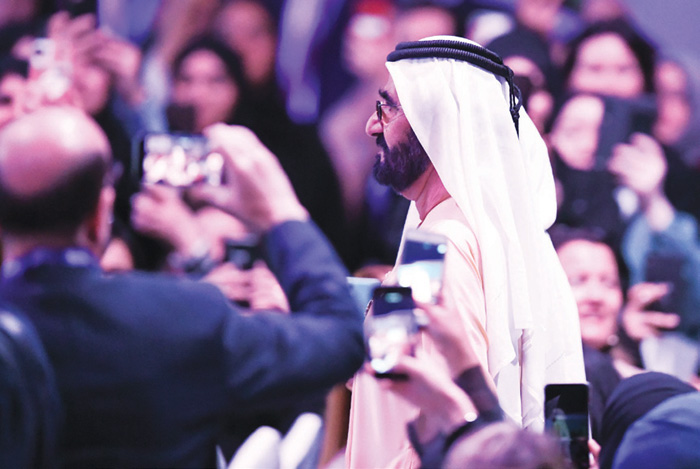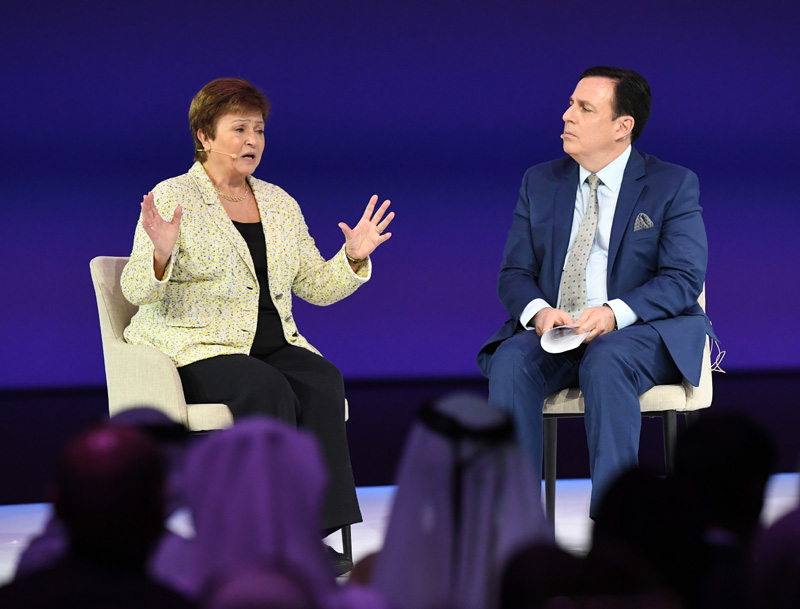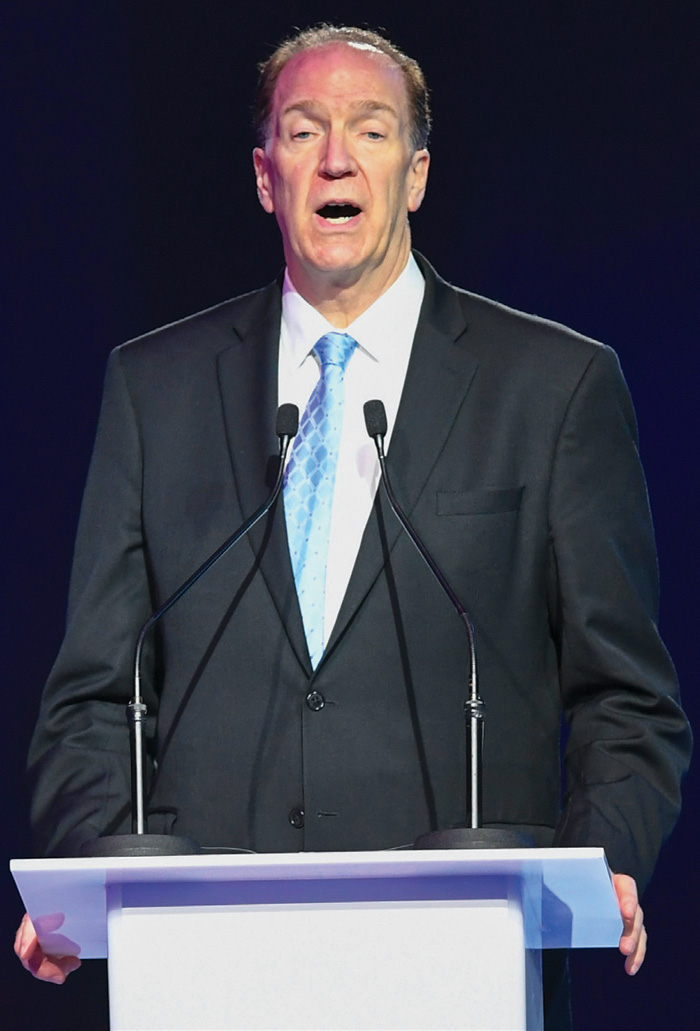DUBAI: Ivanka Trump has commended Saudi Arabia for its efforts in empowering women by changing laws to respect women’s freedom of movement and access to credit and financial services.
Speaking on the first day of the Global Women’s Forum, organized by the Dubai Women Establishment, in Dubai on Sunday, Trump, advisor to US President Donald Trump, congratulated the Kingdom and four other countries in the Middle East and North Africa (MENA) region for instituting significant reforms over the past two years.
“Progress ultimately builds upon progress,” she said. “Bahrain has introduced legislation to prevent discrimination in the workplace; Jordan eliminated legal restrictions on women’s ability to work at night; Morocco expanded women’s land rights; and Tunisia introduced critical laws to combat domestic violence.
“We all need to applaud these achievements and advancements. And yet, we won’t grow complacent because there is still so much more work to be done.”
FASTFACTS
Saudi Arabia scored 70.6 out of 100 in World Bank’s ‘Women, Business and the Law’ report, placing it first among GCC countries and second in the Arab world.
According to the World Bank, increasing female labor force participation in the region can boost the regional GDP by 47 percent.
Trump said too many women continue to face obstacles to entering the workforce, starting their own businesses, reaching their full potential and charting their own future.
In the region, on average, women have only half the legal rights of men, yet their economic equality has the potential to add $600 billion to the global annual GDP by 2025.
“This number represents far more than an economic boom,” she said. “It represents millions of lives full of promise, mothers who can provide for their children, daughters who could be the first to graduate high school, and young women who could start businesses and become job creators. This is the future that we can and must achieve together.”
She lauded the courage to shatter the barriers of inequality and blaze a new path of opportunity that gives hope to millions.

Sheikh Mohammed bin Rashid Al-Maktoum, the United Arab Emirates’ prime minister and ruler of Dubai, attended the forum. (AFP)
White House economists have found that if nations address the five legal barriers, namely accessing institutions, building credit, owning and managing property, traveling freely and restrictions on women’s employment, women’s economic activity could increase the annual global GDP by around $7.7 trillion.
“Imagine the lives transformed, the cities that would be built, the new schools that would open their doors, the children that could be helped, if we could come together and make these reforms a part of our future,” Trump said.
“Every woman here today has an incredible story, from brave innovators to bold entrepreneurs that are bringing greater opportunity to their home countries. You are the women who are going to imagine new industries, discover new cures, create works of beauty and improve lives around the world.”
 She asked nations in the region to come together to continue to work as a whole to break new ground, to institute changes, legally and culturally, that will give every woman a chance to determine her own destiny and bring greater peace and prosperity to this region and to the world.
She asked nations in the region to come together to continue to work as a whole to break new ground, to institute changes, legally and culturally, that will give every woman a chance to determine her own destiny and bring greater peace and prosperity to this region and to the world.
And, although slow, progress is happening. According to the International Monetary Fund (IMF), the gender gap dropped to 20 percent in 2018 compared to 27 percent in 1990.
“I’m convinced the tide is turning,” said Kristalina Georgieva, the IMF managing director.
“We are finally seeing women stepping up and men supporting that because gender equality is morally right but, beyond that, it’s great economics.”
She praised women entrepreneurs, especially in small and medium-sized enterprises (SMEs), that are now categorically proven to be better than men. “If we want the economy to prosper, we have to create space,” she said.
“Knowing that 40 countries are growing five percent or more, but the rest of the world is sluggish, we need the boost that women can provide.”
A world with 100 percent gender equality would add $172 trillion to global wealth, according to the most recent data. “We would be a much richer world,” Georgieva said.
“The time for women is turning in the Middle East. If we are to just bring the MENA to par with the more advanced economies, over the (coming) years, there would be $1 trillion more in output for everybody to share. So, we are talking about very significant improvements.”

Kristalina Georgieva, International Monetary Fund (IMF) managing director, said men are beginning to support the turning tide of women stepping up "because gender equality is morally right." (Supplied)
Beyond economic impact, women create a more diverse workplace and boardrooms, while ultimately “making better decisions. We know that what women often bring more of is consensus orientation,” she said.
“When women are engaged, then we have more peace on the planet, it’s a proven fact. So, for the wellbeing of our societies, the advancement of women is a fabulous gift.”
Furthermore, the World Bank estimates that increasing female labor force participation in the region to the levels of men could boost regional GDP by 47 percent.
“Currently, $575 billion in regional income is lost because of gender-based discrimination in laws, social norms and practices that constrain women’s rights and opportunities,” said David Malpass, president of the World Bank Group.
“Fortunately, more countries recognize that their economies can only reach their full potential with full participation of both women and men. We are focusing on helping countries achieve good development outcomes.”

President of the World Bank Group David Malpass said the bank is helping to unlock the constraints faced by women. (AFP)
Malpass mentioned two key areas where the bank has been working hard, namely laws and regulation and broadening of access to finance. He said, historically, the region has had the lowest score in its “Women, Business and the Law” (WBL) report but, this year, it made the most progress.
“Jordan, Lebanon, Algeria and Bahrain made many reforms,” he said.
“The UAE, and Saudi Arabia in particular, made the most reforms. The UAE has pushed for legislative reforms, including equal pay and female representation in corporate boardrooms, while, in the Kingdom, laws were changed to protect women from employment discrimination and to prohibit employers from dismissing women during pregnancy and maternity leave. And there’s room for every country to improve.”
In the report, Saudi Arabia was ranked 70.6 out of 100 – a 38.8 jump since its last ranking – placing it first among GCC countries and second in the Arab world. “We have committed to double our corporate sourcing for women-owned firms by 2023,” Malpass said.
“We are helping unlock constraints faced by women. There’s still much to do and everyone can play a role.”


























